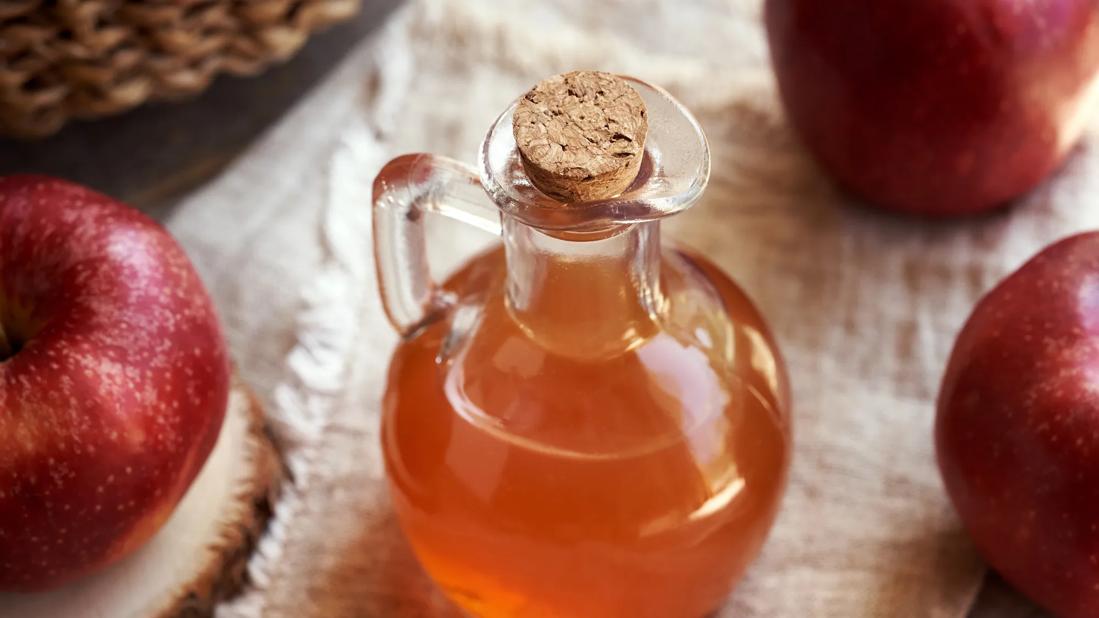ACV may help lower blood sugar and calm acid reflux, but don’t believe all the hype

Apple cider vinegar has been touted as a health tonic for thousands of years. In ancient times, it was used as a treatment for coughs and infections. Today, it’s lauded as a weight loss aid, a remedy for acid reflux and a way to help manage blood sugar.
Advertisement
Cleveland Clinic is a non-profit academic medical center. Advertising on our site helps support our mission. We do not endorse non-Cleveland Clinic products or services. Policy
But can it do all of those things?
There’s room for doubt, with further research needed to support any possible apple cider vinegar benefits.
Apple cider vinegar (ACV) is apple juice that’s been fermented twice. Its claim to fame is acetic acid, which forms during the fermentation process and is thought to have a variety of health benefits.
ACV is made by mixing crushed apples with yeast, sugar or another carbohydrate. After a few weeks, natural bacteria and yeasts ferment the juice, changing the carbohydrates into alcohol. The second fermentation process changes the alcohol into acetic acid.
“If you look at the nutrition facts label, apple cider vinegar doesn’t show high amounts of vitamins, minerals or even calories,” says registered dietitian Beth Czerwony, RD, LD. “Its potential health benefits are found in substances that aren’t part of the standard nutrition label.”
Raw apple cider vinegar contains:
Both pasteurized and raw apple cider vinegar are sold in stores. But for health purposes, most people use raw apple cider vinegar — the kind that’s a little bit cloudy. The cloudy sediment at the bottom of the bottle, sometimes known as “the mother,” contains more natural bacteria and yeasts.
Advertisement
So, is apple cider vinegar good for you? Some studies suggest that apple cider vinegar could boost your health. But Czerwony says most of the studies are small and need further research to support their claims.
Still, it’s worth talking about ACV’s possible benefits.
One of the biggest health claims for apple cider vinegar is related to diabetes and blood sugar management. When you have Type 2 diabetes, your body’s cells can’t properly take up sugar (glucose) from the foods you eat.
An analysis of studies shows evidence that apple cider vinegar may decrease fasting plasma glucose levels when taken with a meal full of complex carbohydrates. It does that by slowing down food’s journey from your stomach to your small intestine (gastric emptying) and the absorption of glucose molecules.
“Apple cider vinegar might lower your glucose a little, but not enough,” cautions Czerwony. “To prevent or manage diabetes, it’s really important to follow a healthy diet and exercise plan.”
If you take medication to lower your blood sugar, it’s best to check in with your doctor before you incorporate apple cider vinegar into your everyday life.
That same meta-review also suggests that apple cider vinegar decreases total cholesterol and triglycerides (a fat found in your blood) while raising “good” cholesterol (HDL).
But Czerwony stresses that larger studies are needed to fully understand the role ACV may play in cholesterol management.
“Research has shown that ACV can improve blood sugars by delaying gastric emptying, which slows down the release of carbohydrates in your body. This may also help with weight loss, particularly belly fat,” explains Czerwony. “It has also been shown that ACV improves cholesterol levels, which is more pronounced in people who have Type 2 diabetes.”
Gastroesophageal reflux disease, GERD, acid reflux, heartburn — no matter what you call it, it’s unpleasant. And if it happens to you on the regular, you’re probably desperate for a remedy.
Some people swear by apple cider vinegar for acid reflux. The idea is that because ACV is a probiotic, it can introduce “good” bacteria into your gut and lead to digestive balance that lessens your GERD symptoms. Seems likely enough, right?
“There’s no real science to back up the claims about ACV’s anti-heartburn power,” Czerwony states. “But if your healthcare provider says it’s OK for you to take, then there’s likely no harm either.”
Some people claim that apple cider vinegar has helped them lose weight, but the science isn’t solid.
Researchers once thought that acetic acid could help you burn more fat and change your body’s appetite-stimulating hormones. That’s no longer thought to be true.
Advertisement
But a systematic review of studies shows that apple cider vinegar can help you stay full for longer, which can curb the urge to snack for about two hours after eating. And another study of 120 adolescents and young adults with overweight and obesity shows that ACV may contribute to a decrease in body weight and body mass index (BMI).
Still, don’t count on ACV to help you shed pounds.
“There’s no concrete evidence that it has any long-term appetite suppression benefits,” Czerwony clarifies.
Because it’s fermented, ACV is chock-full of natural probiotics, which Czerwony says can balance gut microbiota and improve immune health.
“The high levels of polyphenols neutralize free radicals in our bodies,” she shares. “Because of its antibacterial properties and improvement of gut microbiota, this ultimately will improve gut health, which indirectly improves cellular health.”
ACV contains antioxidants that protect your cells against free radicals, which are atoms, molecules and ions that can alter your cellular DNA.
Apple cider vinegar is highly acidic, which can present some problems.
Its acidity can erode your tooth enamel, the protective shield on the outside of your teeth. Once it wears away, you can’t get it back. The acetic acid in straight, undiluted ACV can also burn your esophagus.
Advertisement
“To help prevent these problems, water down your ACV by adding a tablespoon to a mug of warm water,” Czerwony advises. “This cuts down on the amount of acid hitting your teeth and throat.”
Other possible side effects include:
If you have gastroparesis (a disorder that makes it hard for food to move through your digestive tract), it’s important to be mindful that apple cider vinegar slows down gastric emptying.
You should also keep pure ACV out of reach of kids so they can’t drink it or get it on their skin, which may cause a burn.
There’s no standard dosage of apple cider vinegar, so ask a healthcare provider how much is safe for you and always be sure to follow the directions on the product label.
Advertisement
“The evidence so far says apple cider vinegar is safe for most people in small amounts,” Czerwony says. “But keep in mind that it hasn’t been approved to treat any health conditions.”
If you’re curious about the potential benefits, you can start with just a few drops mixed in water. You can work your way up, if you want, to no more than two tablespoons per day. You can also:
Apple cider vinegar is also available in pills or gummies, though the U.S. Food and Drug Administration (FDA) doesn’t regulate these supplements.
As we don’t fully understand all the health benefits of apple cider vinegar, it’s important that you check with a healthcare provider before using apple cider vinegar (or any other natural health remedy).
“ACV is not a miracle cure and doesn’t replace a healthy diet,” stresses Czerwony. “There are some studies which show promise, but it’s not a quick fix.”

Sign up for our Health Essentials emails for expert guidance on nutrition, fitness, sleep, skin care and more.
Learn more about our editorial process.
Advertisement

Your tolerance decreases with age, thanks to body changes, health conditions and medications you may take

‘Blackout rage gallons’ can lead to dangerous levels of alcohol consumption

An enzyme deficiency or rosacea are potential causes of alcohol flush

Yes, grabbing a few beers or a couple of glasses of wine or cocktails with friends can increase your heart rate — dangerously in some cases

Alcohol (in any amount) is a well-known cause of cancer

Forget the myth and answer nature’s call when your bladder feels full

Alcohol provides empty calories, heightens cravings and may slow down your metabolism

Drinking during the day can result in drinking more than usual and worsen your sleep cycle

The tropical fruit is a good source of antioxidants and vitamin C

Most people fall asleep within 10 to 20 minutes, but if your experience is different, adjusting your sleep schedule may help

Exploring your hidden side can lead to better understanding of what makes you tick